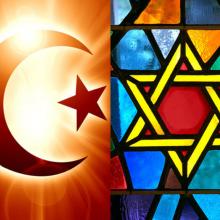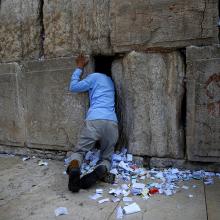Jewish
The day after President-elect Donald Trump appointed a man accused of anti-Semitism and Islamophobia as his chief strategist, two of the nation’s largest Jewish and Muslim advocacy groups formed an unprecedented partnership to fight bigotry.
The American Jewish Committee and the Islamic Society of North America, on Nov. 14, launched the new national group: The Muslim-Jewish Advisory Council. Though Jewish and Muslim groups have cooperated before, the size and influence of these two particular groups — and the prominence of the people who have joined the council — marks a milestone in Jewish-Muslim relations.
Hoping for divine intervention – or Jewish votes – Donald Trump wrote a short prayer to be inserted in between the stones of the Western Wall.
Trump’s team photographed and sent a copy of the handwritten prayer to Ynet News and Yedioth Ahronoth, Israeli sister publications. The original was handed to David Faiman, a Trump advisor, who was heading to Israel, the news outlets reported.

Image via Minerva Studio/Shutterstock.com
The incident seems like a straightforward hate crime: Swastikas sprayed in and around the New Jersey home of an Indian-American running for Congress earlier this month.
But the vandalism is steeped in religious and ethnic irony.
The site where, nearly 2,000 years ago, the Roman army breached the outer walls of ancient Jerusalem, before capturing the city and destroying the Second Jewish Temple, has been discovered, the Israel Antiquities Authority says.
Archaeologists made the discovery last winter, during an exploratory survey at a future construction site, the IAA said on Oct. 20.
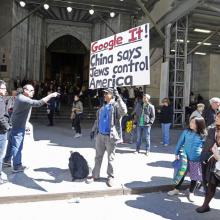
Image via a katz/Shutterstock.com
A report released on Oct. 19 by the Anti-Defamation League does not directly indict Trump for this upswing in anti-Semitism. But it explicitly connects some of his supporters to the hate speech.
“The spike in hate we’ve seen online this election season is extremely troubling and unlike anything we have seen in modern politics,” said ADL CEO Jonathan Greenblatt.

Image via REUTERS / Kacper Pempel / RNS
Pope Francis on July 29 paid a silent visit to the Auschwitz concentration camp where he spent intense moments in prayer, embraced Holocaust survivors, and met those who risked their lives to help Jews persecuted by the Nazis.
But while Francis made no speeches during his time at the notorious camp, where more than 1 million people, mostly Jews, died during World War II, he left a simple written plea in the guest book: “Lord, have mercy on your people! Lord, forgiveness for so much cruelty!”

Noah Leavitt and Talia Kim-Leavitt with their kids Ari and Talia. Image via Kim-Leavitt family / RNS
Noah Leavitt and Helen Kiyong Kim’s marriage is one of an increasing number of Jewish-Asian pairings in the U.S., a trend evident in many American synagogues. The two Whitman College professors have just released the first book-length study of Jewish-Asian couples and their offspring.
Though JewAsian is geared toward social scientists, the chapters in which they excerpt and analyze their interviews with 34 Jewish-Asian couples will interest any readers curious about intermarriage in general, and the evolving American-Jewish community in particular.
IN THE EARLY 20th century, a group of esteemed scholars gathered in a little northeastern pocket of their own making and concerned themselves with the question of finding a distinctly American music. Where was this music? How might it develop? Could there be, out there somewhere, an American Bach?
They looked far and wide in the places that they knew; they searched for faces that they might recognize; they listened deeply in the idioms with which they were familiar. And they came away disappointed.
Jazz critic Gary Giddins chortles as he recounts the tale, pointing out that if these American Brahmins had simply deigned to take a train south from Boston to New York City, and stepped into the Roseland Ballroom on a Thursday night, they would have experienced the American Bach, Dante, and Shakespeare all rolled into one: Louis Armstrong.
Born to a 15-year-old who sometimes worked as a prostitute, raised in a New Orleans neighborhood so violent it was known as “the Battlefield,” sent to a juvenile detention facility at 11 for firing a gun into the street—his early years would surely put him on the pipeline to prison today.
Had that occurred, the distinctly American music that Louis Armstrong created might never have happened. The American songbook, as we know it today, simply would not exist.
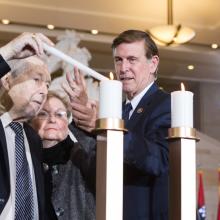
Image via United States Holocaust Memorial Museum / RNS
At Holocaust Remembrance Day at the Capitol, speakers warned of anti-Semitism as a problem of the millennia, and hate speech as a challenge that threatens present-day America.
Eight elderly survivors of the Holocaust — which took the lives of 6 million Jews, including 1.5 million Jewish children — lit six candles at the Capitol’s Emancipation Hall on May 5 as a United States Holocaust Memorial Museum official told of the death camps they survived, and of those who had risked their lives to save them.

Image via Reuters/Jonathan Ernst/RNS
President Obama’s nominee for the Supreme Court, Merrick Garland, would be the current court’s fourth Jewish justice if confirmed.
For Jews, who represent about two percent of the population, holding 44 percent of the seats on the court might be a point of pride.
But is it anything more than that?
Bernie Sanders’ primary victory in the Granite State Feb. 9 made him the first-ever non-Christian to win a presidential primary in U.S. history. In addition, depending on whether you count Barry Goldwater as Jewish (his ancestors were Jewish but he identified as Episcopalian), Bernie Sanders could be considered the first Jewish primary winner in history as well.
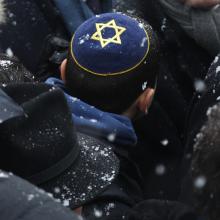
Image via REUTERS/Vincent Kessler/RNS
Claude Chiche doesn’t wear a skullcap, but he has strong opinions about them. “There are some here want to take off their kippah because they’re afraid,” said Tunisian-born Chiche, referring to the Hebrew word for yarmulke or skullcap. “But they shouldn’t accept this; they shouldn’t give in to fear.”
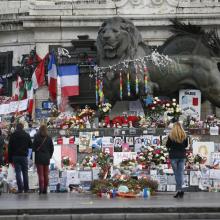
Image via REUTERS / Charles Platiau / RNS
As France marks the anniversary of the terrorist shootings that targeted a kosher supermarket and a satirical weekly, a new report warns anti-Semitism here continues to rise, taking a myriad of underreported forms.
“Violence targeting Jews and Jewish sites has led to a heightened sense of insecurity, and an increasing number of Jews are relocating in or outside France for security reasons,” U.S. advocacy group Human Rights First wrote in a report published Jan. 7.
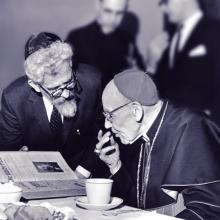
Rabbi Abraham Joshua Heschel and Cardinal Augustine Bea, who was instrumental to "Nostra Aetate." Image via American Jewish Committee / RNS
A statement by a group of Orthodox rabbis calls Christianity part of a divine plan in which God would have Jews and Christians work together to redeem the world.
Although signed so far by 28 rabbis mostly from the more liberal wing of the most traditional branch of Judaism, the statement marks a turning point for Orthodox Jews, who until now have limited interfaith cooperation to working on social, economic and political causes. But this statement puts Christianity in a distinct Jewish theological perspective — and an extremely positive one.
“(W)e acknowledge that Christianity is neither an accident nor an error, but the willed divine outcome and gift to the nations,” the seven-paragraph statement, issued on Dec. 3, asserts.
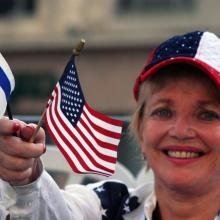
Image via ChameleonsEye / Shutterstock.com
The head of a national Republican Jewish activist group predicted on Nov. 10 that dissatisfaction with the Iran nuclear deal will increase the GOP's share of the Jewish vote in 2016. His Democratic counterpart argued that Jewish Americans, who overwhelmingly vote for his party, are divided over the deal and prioritize other issues.
The debate took place at one of the largest annual gatherings of Jewish activists in the world — the General Assembly of the Jewish Federations of North America — just hours before an address to the group by Israeli Prime Minister Benjamin Netanyahu.
“I say it with a broken heart and a lot of sadness,” said Republican Jewish Coalition Executive Director Matt Brooks on what he alleged is flagging Democratic support for Israel in recent years.

Rabbi Jonathan Sacks. Image via Blake-Ezra Photography / RNS
Religious zealots fill newspapers and screens with bloody images of bombings and beheadings. They kidnap children and make them into soldiers. They pray before they rape women.
But “not in God’s name,” says Rabbi Lord Jonathan Sacks, the former chief rabbi of Great Britain, who just published a book by that title.
“The greatest threat to freedom in the post-modern world is radical, politicized religion,” Sacks writes. Religion News Service asked Sacks how people can kill in the name of God, and how religion can counter religious extremists.
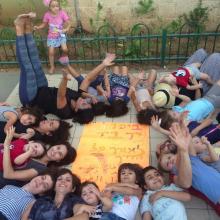
Image via Hand in Hand / RNS
Amid ongoing violence between Palestinians and Israelis, a school in Jaffa seems more determined than ever to teach Arab and Jewish children about coexistence.
In a sunny playground here just 3 miles south of Tel Aviv, children paint recycled tires in vibrant colors and refurbish wooden furniture to beautify a place that many in the community say is their best chance at a peaceful future.
This is the Jaffa branch of “Yad b’Yad” — or “Hand in Hand” in both Hebrew and Arabic — a school made up of four kindergarten and two first-grade classes that aims to respond to growing Jewish-Arab segregation and violence with mutual respect and open dialogue.
“Psychologically, this is the only place where we feel that my children, and my neighbor’s children, are secure,” said Hani Chamy, an Arab engineer and generations-old resident of Jaffa who was one of the first parents to send her two girls to the pre-school.
“It’s a great relief.”

Image via iravgustin/Shutterstock.com
My rabbinic colleague, David Saperstein, the U.S. ambassador-at-large for international religious freedom, issued a “glass half full” report earlier this month, noting that “… over the last several years there’s been a steady increase in the percentage of people who live in countries that … have serious restrictions on religious freedom.”
At the same time, he noted, “we’ve seen enormous expansion of interfaith efforts on almost every continent to try and address the challenges.”
Much of that “enormous expansion of interfaith efforts” can be traced to the historic Nostra Aetate (Latin for “In Our Time”) Declaration that the world’s Catholic bishops adopted 50 years ago at the conclusion of the Second Vatican Council.

Actress Mayim Bialik. Photo via REUTERS / Danny Moloshok / RNS
Emmy-winning actress and neuroscientist Mayim Bialik isn’t afraid to speak out about her sometimes-unconventional social views, from writing a book about attachment parenting to criticizing hyper-sexualized celebrities in a recent essay.
Now, she’s talking candidly about religion in entertainment, claiming that “it’s never going to be trendy to be observant or religious in Hollywood circles” in an interview with FOX411.
WHITE HOUSE Chief of Staff Denis McDonough told an audience this spring that “an occupation that has lasted for almost 50 years must end, and the Palestinian people must have the right to live in and govern themselves in their own sovereign state.”
McDonough decried the illegal construction of settlements in Palestinian territory, under Israeli Prime Minister Benjamin Netanyahu and his predecessors, as intentionally seeking to divide Palestinian communities. He added, “like every administration since President Johnson, we will continue to oppose Israeli settlement activity since it undermines the prospects for peace.”
But many activists refuse to continue to merely decry the occupation, year after year, decade after decade, while facts on the ground worsen and a just peace grows seemingly more elusive. For these activists—and they include many U.S. churches, peace groups, and humanitarian organizations—the time has come to put teeth into efforts to end Israel’s occupation of Palestinian territory and thereby impel progress toward a just peace in the region.
The Presbyterian Church (U.S.A.) has been debating various divestment measures since 2004, and last year the denomination voted to divest from three companies that supply equipment used in the occupation of Palestinian territory.
